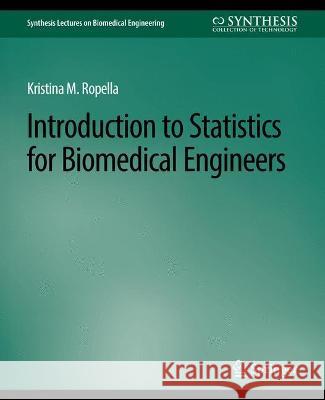Introduction to Statistics for Biomedical Engineers » książka
Introduction to Statistics for Biomedical Engineers
ISBN-13: 9783031004926 / Angielski / Miękka / 2007
There are many books written about statistics, some brief, some detailed, some humorous, some colorful, and some quite dry. Each of these texts is designed for a specific audience. Too often, texts about statistics have been rather theoretical and intimidating for those not practicing statistical analysis on a routine basis. Thus, many engineers and scientists, who need to use statistics much more frequently than calculus or differential equations, lack sufficient knowledge of the use of statistics. The audience that is addressed in this text is the university-level biomedical engineering student who needs a bare-bones coverage of the most basic statistical analysis frequently used in biomedical engineering practice. The text introduces students to the essential vocabulary and basic concepts of probability and statistics that are required to perform the numerical summary and statistical analysis used in the biomedical field. This text is considered a starting point for important issues to consider when designing experiments, summarizing data, assuming a probability model for the data, testing hypotheses, and drawing conclusions from sampled data.A student who has completed this text should have sufficient vocabulary to read more advanced texts on statistics and further their knowledge about additional numerical analyses that are used in the biomedical engineering field but are beyond the scope of this text. This book is designed to supplement an undergraduate-level course in applied statistics, specifically in biomedical engineering. Practicing engineers who have not had formal instruction in statistics may also use this text as a simple, brief introduction to statistics used in biomedical engineering. The emphasis is on the application of statistics, the assumptions made in applying the statistical tests, the limitations of these elementary statistical methods, and the errors often committed in using statistical analysis. A number of examples from biomedical engineering research and industry practice are provided to assist the reader in understanding concepts and application. It is beneficial for the reader to have some background in the life sciences and physiology and to be familiar with basic biomedical instrumentation used in the clinical environment.Contents: Introduction / Collecting Data and Experimental Design / Data Summary and Descriptive Statistics / Assuming a Probability Model from the Sample Data / Statistical Inference / Linear Regression and Correlation Analysis / Power Analysis and Sample Size / Just the Beginning / Bibliography











